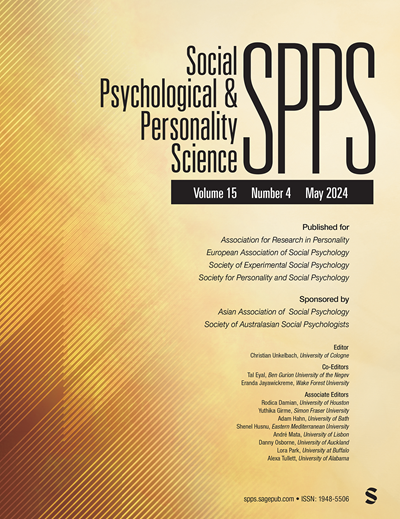基于群体的不公正,而非基于群体的经济不平等,可预测 18 个非洲国家的政治暴力事件
IF 3.3
2区 心理学
Q1 PSYCHOLOGY, SOCIAL
引用次数: 0
摘要
政治暴力给人类带来了巨大的痛苦。学者们指出,种族群体之间的经济不平等是造成此类暴力的主要原因。然而,人们对基于群体的不平等、基于群体的不公正和政治暴力之间的关系并不完全了解。结合有关集体行动的社会心理学研究和有关国内冲突的政治学研究,我们强调,是基于群体的不公正激发了暴力。如果认为自己的群体受到了不公正的对待,往往会产生与冲突有关的情绪(如愤怒)。相比之下,仅仅认为自己的群体经济地位较低则很少产生这种情绪。此外,感知到的经济劣势与感知到的政治效能呈负相关,这可能会劝阻人们参与政治暴力。为了评估这些论点,我们利用来自 18 个非洲国家的概率样本(37,000 人)对参与政治暴力的态度、意图和自我报告进行了分析。我们发现,无论是否控制基于群体的经济不平等,基于群体的感知不公正的测量结果都能预测所有暴力结果;而基于群体的感知不平等的测量结果能预测(负面)自我报告的暴力参与情况,但不能预测其他结果。我们推进了社会心理学和政治学的研究,认为基于群体的不公正和不平等是不同的概念,通过不同的途径与政治暴力相关。本文章由计算机程序翻译,如有差异,请以英文原文为准。
Group-Based Injustice, but Not Group-Based Economic Inequality, Predicts Political Violence Across 18 African Countries
Political violence causes immense human suffering. Scholars pinpoint economic inequalities between ethnic groups as a major cause of such violence. However, the relationships between group-based inequality, group-based injustice, and political violence are not fully understood. Combining insights from social psychological research on collective action and political science research on civil conflict, we underscore that it is group-based injustice that motivates violence. A perception that one’s group has been treated unfairly tends to produce conflict-related emotions (e.g., anger). By contrast, a mere perception that one’s group is of lower economic status rarely produces such emotions. Furthermore, perceived economic disadvantage negatively relates to perceived political efficacy, which may dissuade engagement in political violence. To assess these arguments, we analyzed attitudes toward, intentions to engage in, and self-reported engagement in political violence, utilizing probability samples from 18 African countries ( N > 37,000). We found that measures of group-based perceived injustice, whether controlling or not for group-based economic inequality, predicted all violent outcomes; whereas measures of perceived group-based inequality predicted (negatively) self-reported participation in violence but not the other outcomes. We advance both social psychological and political science literatures, suggesting that group-based injustice and inequality are distinct constructs, relating to political violence via different pathways.
求助全文
通过发布文献求助,成功后即可免费获取论文全文。
去求助
来源期刊

Social Psychological and Personality Science
PSYCHOLOGY, SOCIAL-
CiteScore
12.50
自引率
1.80%
发文量
77
期刊介绍:
Social Psychological and Personality Science (SPPS) is a distinctive journal in the fields of social and personality psychology that focuses on publishing brief empirical study reports, typically limited to 5000 words. The journal's mission is to disseminate research that significantly contributes to the advancement of social psychological and personality science. It welcomes submissions that introduce new theories, present empirical data, propose innovative methods, or offer a combination of these elements. SPPS also places a high value on replication studies, giving them serious consideration regardless of whether they confirm or challenge the original findings, with a particular emphasis on replications of studies initially published in SPPS. The journal is committed to a rapid review and publication process, ensuring that research can swiftly enter the scientific discourse and become an integral part of ongoing academic conversations.
 求助内容:
求助内容: 应助结果提醒方式:
应助结果提醒方式:


